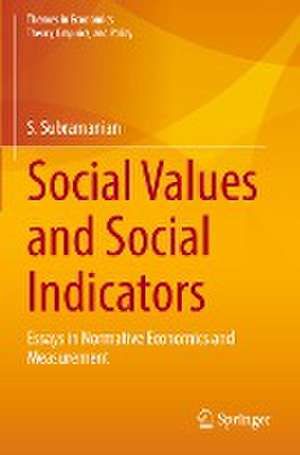Social Values and Social Indicators: Essays in Normative Economics and Measurement: Themes in Economics
Autor S. Subramanianen Limba Engleză Paperback – 26 sep 2022
| Toate formatele și edițiile | Preț | Express |
|---|---|---|
| Paperback (1) | 483.12 lei 6-8 săpt. | |
| Springer Nature Singapore – 26 sep 2022 | 483.12 lei 6-8 săpt. | |
| Hardback (1) | 586.23 lei 6-8 săpt. | |
| Springer Nature Singapore – 25 sep 2021 | 586.23 lei 6-8 săpt. |
Preț: 483.12 lei
Nou
Puncte Express: 725
Preț estimativ în valută:
92.46€ • 100.39$ • 77.66£
92.46€ • 100.39$ • 77.66£
Carte tipărită la comandă
Livrare economică 22 aprilie-06 mai
Preluare comenzi: 021 569.72.76
Specificații
ISBN-13: 9789811604300
ISBN-10: 9811604304
Pagini: 194
Ilustrații: XI, 194 p. 8 illus., 2 illus. in color.
Dimensiuni: 155 x 235 mm
Greutate: 0.31 kg
Ediția:1st ed. 2021
Editura: Springer Nature Singapore
Colecția Springer
Seria Themes in Economics
Locul publicării:Singapore, Singapore
ISBN-10: 9811604304
Pagini: 194
Ilustrații: XI, 194 p. 8 illus., 2 illus. in color.
Dimensiuni: 155 x 235 mm
Greutate: 0.31 kg
Ediția:1st ed. 2021
Editura: Springer Nature Singapore
Colecția Springer
Seria Themes in Economics
Locul publicării:Singapore, Singapore
Cuprins
Chapter 1: “Instrumentalism” and Friedman’s Methodology: A Short Objection.- Chapter 2: A Sort of Paretian Liberalism.- Chapter 3: Liberty, Equality, and Impossibility: Some General Results in the Space of “Soft” Preferences.- Chapter 4: The Arrow Paradox with Fuzzy Preferences.- Chapter 5: Equality, Priority, and Distributional Judgements.- Chapter 6: Two Logical and Normative Issues Relating to Measurement in the Social Sciences.- Chapter 7: Social Groups and Economic Poverty: A Problem in Measurement.- Chapter 8: Reckoning Sub-Group Poverty Differentials in the Measurement of Aggregate Poverty.- Chapter 9: Poverty Measurement in the Presence of a “Group Affiliation Externality”.- Chapter 10: Revisiting the Normalization Axiom in Poverty Measurement.- Chapter 11: The Focus Axiom and Poverty: On the Co-existence of Precise Language and Ambiguous Meaning in Economic Measurement.- Chapter 12: Assessing Inequality in the Presence of Growth.- Chapter 13: Revisiting an Old Theme in the Measurement of Inequality and Poverty.- Chapter 14: Inequality Measurement with Subgroup Decomposability and Level-Sensitivity.
Notă biografică
S. Subramanian has served as a Professor at the Madras Institute of Development Studies, Chennai, India. An economist with research interests in poverty, inequality, demography, welfare economics, collective choice theory and development economics, he has published widely in professional journals, and is the author of (among other books) The Poverty Line (2012), and more recently the very successful SpringerBrief Inequality and Poverty: A Short Critical Introduction (2019). He is an elected Fellow of the Human Development and Capabilities Association, and was a member of the Advisory Board of the World Bank’s Commission on Global Poverty.
Textul de pe ultima copertă
The book is a collection of essays written since 2010, and dealing, in one way or another, with the place of values in economic analysis. The centrality of values in the collection is not surprising, given that the thematic concerns informing the essays in the book relate principally to methodological issues in economic enquiry, to the normatively constrained aggregation of personal preferences into collective choice, and to problems of logical coherence and ethical appeal in the axiom systems underlying the measurement of economic and social phenomena such as poverty, inequality and literacy. While many of the essays are more or less technical in nature, they are all explicitly motivated by considerations that go beyond the formalisms of presentation to an involvement with the role of moral reasoning in economic analysis. In particular, the essays emphasize the importance of ‘ought propositions’ in a science which is all too often regarded as being wholly and exclusively ‘positive’ in its orientation. The book should be of particular interest to researchers, students, and public policy makers.
Caracteristici
Discusses through 14 chapters, varied topics such as Friedman’s methodology, Paretian liberalism, Arrow Paradox, Derek Parfit’s arguments, and social indicators, principally indicators of poverty and inequality Addresses key issues in economic analysis with a philosophical slant Deals with concerns that are informed by normative considerations which deserve to be addressed and debated




